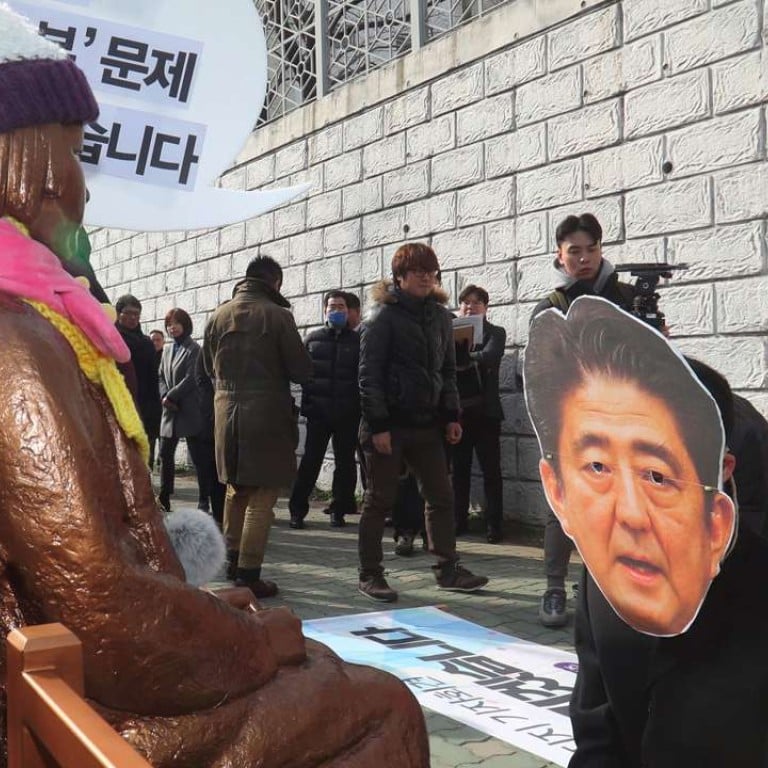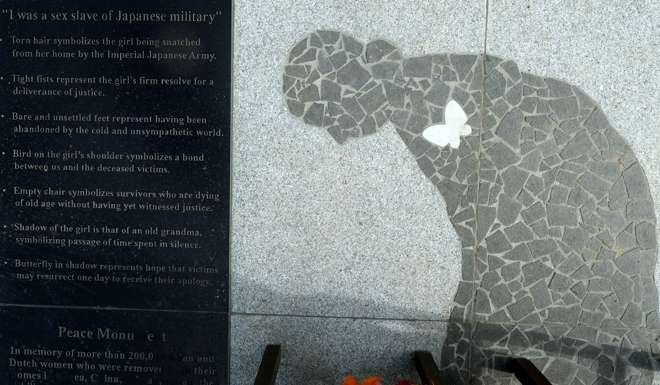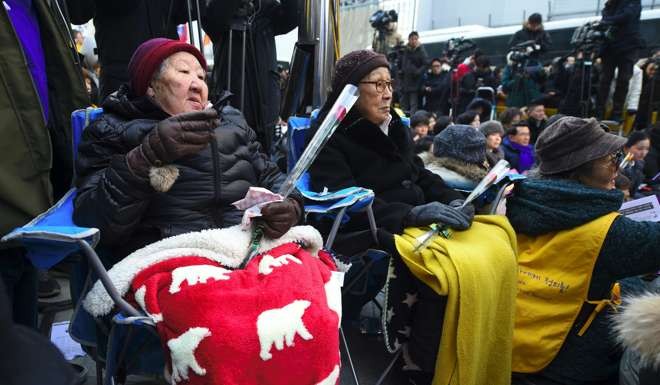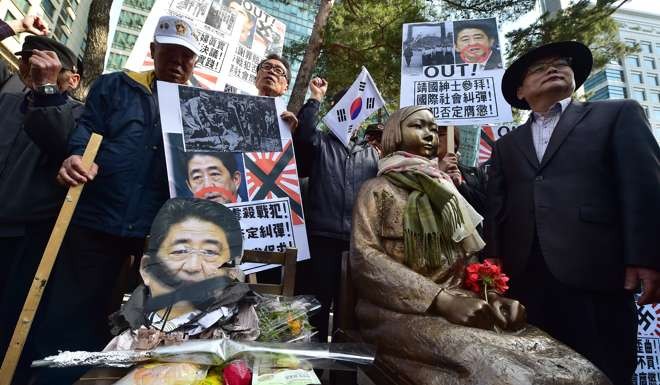
Can Korea handle the truth about Japan’s 'comfort women'?
As a stalemate emerges in the countries’ dispute over wartime sex slaves, Seoul’s refusal to hear dissenting views must shoulder some of the blame for the deadlock
With its recall of two diplomats this week, Japan appears to have upped the ante in its long-running dispute with Korea over its use of wartime sex slaves, reigniting enmities over an issue that had until recently seemed tantalisingly close to a conclusion.
And standing in the way of what might have been a watershed moment in diplomatic relations between the two countries? The statue of a teenage girl.
Rewind just a year and it appeared Seoul and Tokyo had reached a measure of closure over wartime Japan’s use of what were euphemistically known as “comfort women” – the reportedly hundreds of thousands of women, mainly from Korea, recruited to serve in its military-run brothels during the second world war.
WATCH: Japan to recall its South Korea envoy over ‘comfort women’ statue
But any lingering such notions were dispelled when Nagamine Yasumasa, the ambassador to South Korea, and Morimoto Yasuhiro, the consul general in Busan, returned to Japan on January 9.
That move, prompted by Tokyo’s displeasure over statues symbolising “comfort women” in front of the Japanese embassy in Seoul and consulate in Busan, was the first high-level diplomatic recall by Japan since August 2012, when South Korea’s then president, Lee Myung-bak, visited the disputed islets of Dokdo (known as Takeshima in Japan).

Yet chances of the two countries putting the issue behind them had once, albeit briefly, seemed so promising. On December 28, 2015, Japanese Foreign Minister Kishida Fumio and South Korean Foreign Minister Yun Byung-se struck a landmark deal in which Tokyo agreed to pay 1 billion yen (HK$67 million) to the surviving victims and issue a formal apology.
For its part, South Korea agreed to consider the matter resolved and to speak with relevant organisations about the removal of the comfort woman statue in front of the embassy. So when Japan paid the 1 billion yen and Prime Minister Shinzo Abe apologised, hopes of closure on the issue – and a new era for Japanese-Korean relations – did not seem so far-fetched.
South Korean self-immolates over ‘comfort women’ deal with Japan, as PM Abe urges Seoul to remove new statue
Except Korea then decided that Abe’s apology did not go far enough and therefore the matter was not resolved. Not only does the statue in front of the Seoul embassy remain standing, it now has a sister. In December 2016 – one year after that “landmark deal” – a replica of the statue was installed outside the Japanese consulate in Busan. That statue was briefly confiscated by police, as the group that installed it had done so without a permit, but it returned after a flood of protests from the public.

Tokyo asked for both statues to be removed, but Seoul replied that it had spoken to the civic groups involved and had no further responsibility. This led Tokyo to recall the diplomats and Woo Sang-ho, floor leader of the Minjoo Party of Korea, to suggest that, rather than remove the statues, Korea should return the 1 billion yen.
Since then, public opinion on each side of the debate has hardened, and what had seemed like a watershed moment now appears more like a stalemate.
The United States seems to have backed Seoul in the deadlock, with Secretary of State John Kerry on Thursday commending Korea for faithfully implementing its side of the 2015 agreement.
WATCH: South Korea, Japan reach landmark agreement to resolve ‘comfort women’ issue
Yet it may be that much of the blame for the deadlock lies not with the former aggressor, Japan, but with its victim.
“Give me the liberty to know, to utter, and to argue freely,” the English poet John Milton said in his polemic Areopagitica, which begins by paying respect to England for overcoming the tyranny of Charles I.
Similarly, any criticism of Korea should begin with an acknowledgement of the admirable distance it has travelled from the stupid and corrupt leadership of the Joseon era, the maniacal raping and pillaging of Japanese colonialists and the bloodthirsty dictatorships of its early democracy. Korea has come a long way and deserves a great measure of respect as a free and open society, but as Milton puts it, the freedom to speak must be paired with the freedom to know.

For this reason, it is perhaps telling that in this debate, one party refuses to entertain dissenting views, while the other at least consents to look at all the evidence.
While Japan considers other views – modern awareness of the “comfort women” issue began with the Japanese writer Senda Kakou – the Korean government is hostile to any voices that depart from its narrative. This should be a red flag.
Reconciliation cannot wait for the ‘comfort women’ victims of wartime Japan
Park Yu-ha, a professor of Japanese literature at Seoul’s Sejong University, published a book in 2013 titled Comfort Women of Empire, in which she detailed a nuanced history that included not only sex slaves, but prostitutes. She criticised Japanese right-wing extremists, argued that Japan should take responsibility for its actions, explained how its past attempts to do so had failed and described the role Korean collaborators played in trafficking Korean women for financial gain. In February 2015, the Korean government ordered her to redact 34 passages. In January 2016, a Korean court ordered her to pay 10 million won (HK$65,000) each to nine former comfort women for defamation.
This should be weighed alongside the scandal regarding Korea’s state-authored textbooks that depict the dictator Park Chung-hee in a favourable light. One might reply to this that Japan, too, has its own textbook scandal, involving books that depict its wartime atrocities in a favourable light, but those textbooks were created by a private right-wing group and were only ever used by 0.02 per cent of Japanese middle schools.

If anything, the textbooks are evidence of Japan’s freedom of speech – as are the schools in Japan that openly teach North Korean propaganda, something that would be illegal in South Korea. Officially, this illegality is because the South is still technically at war with the North, but there are plenty of other examples of Korean censorship. The country banned Japanese manga until 1998, restricted Japanese music until 1999 and restricted Japanese film until 2004. In 2014, the Korean song Uh-ee by the K-pop group Crayon Pop, was banned because it contained a Japanese word, pikapika (sparkling).
Restrictions on free speech – of which Korea seems fond – tend to injure and blur the truth.
Given this, it’s worth returning to the issue of “comfort women” to consider what ought to be a basic, objective, fact – the number of Korean victims involved.
South Korean ‘comfort women’ continue to fight sex slavery accord with Japan
The Korea Herald has repeatedly cited “up to 200,000 women, mostly from Korea”, and this is in line with other Korean sources. But this number deserves more attention than it tends to get.
In The Comfort Women: Sexual Violence and Postcolonial Memory in Korea and Japan, Chunghee Sarah Soh, a professor of anthropology at San Francisco State University who specialises in issues related to gender and sexuality, says the widely cited figure of 200,000 comes from a 1981 essay in the Hanguk Ilbo by Yun Cheong-ok, a professor of English literature who claims that of 200,000 “volunteers” only 50,000 to 70,000 were sent to the front lines to become comfort women.
Yun “did not reveal the source of the figures given in her essay”, Soh says. She tells us a writer named Kim Teok-seong used the same figures a decade earlier in an article in Seoul Sinmun, and provides an excerpt.

“From 1943 to 1945 approximately 200,000 Korean and Japanese women were mobilised as cheongsindae [comfort women for the Japanese military],” Kim wrote. “The estimated number of Koreans among them is between fifty and seventy thousand.”
In other words, according to these sources, not all 200,000 were used as comfort women, and even of those that were, not all were Korean. On the other hand, Kim makes no mention of recruits prior to 1943, when most comfort women survivors say they were recruited.
Learn from the past to build a better world, ‘comfort women’ historian urges young Chinese
One way or the other – whether too high or low – the often-cited 200,000 figure is highly questionable.
Yet any such suggestion would be shouted down in Korea, or never even heard, creating an echo chamber of opinion. This does an injustice not only to truth and Korean democracy, but to the victims, as well.
As the diplomatic battle with Tokyo continues, Seoul’s best weapon isn’t the outrage of the public, but a forum in which all ideas can be heard and openly defeated, or accepted.

“There can be no denial of the tragic victimisation of forcibly recruited women,” Soh concludes, adding that “it was Japan’s colonialism that undoubtedly facilitated the large-scale victimisation of tens of thousands of Korean women”.
But “the causes of surviving victims’ lifelong sufferings are often more complex and divergent than the nationalistic and transnational discourse of Japan’s comfort women phenomenon would suggest”. ■

